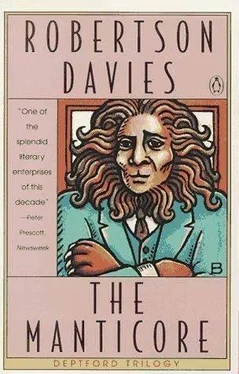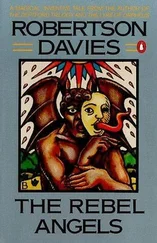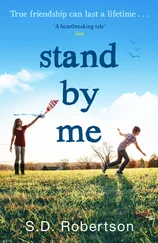Robertson Davies - The Manticore
Здесь есть возможность читать онлайн «Robertson Davies - The Manticore» весь текст электронной книги совершенно бесплатно (целиком полную версию без сокращений). В некоторых случаях можно слушать аудио, скачать через торрент в формате fb2 и присутствует краткое содержание. Жанр: Триллер, на английском языке. Описание произведения, (предисловие) а так же отзывы посетителей доступны на портале библиотеки ЛибКат.
- Название:The Manticore
- Автор:
- Жанр:
- Год:неизвестен
- ISBN:нет данных
- Рейтинг книги:3 / 5. Голосов: 1
-
Избранное:Добавить в избранное
- Отзывы:
-
Ваша оценка:
- 60
- 1
- 2
- 3
- 4
- 5
The Manticore: краткое содержание, описание и аннотация
Предлагаем к чтению аннотацию, описание, краткое содержание или предисловие (зависит от того, что написал сам автор книги «The Manticore»). Если вы не нашли необходимую информацию о книге — напишите в комментариях, мы постараемся отыскать её.
The Manticore — читать онлайн бесплатно полную книгу (весь текст) целиком
Ниже представлен текст книги, разбитый по страницам. Система сохранения места последней прочитанной страницы, позволяет с удобством читать онлайн бесплатно книгу «The Manticore», без необходимости каждый раз заново искать на чём Вы остановились. Поставьте закладку, и сможете в любой момент перейти на страницу, на которой закончили чтение.
Интервал:
Закладка:
But why, Ramsay would ask, do we confine our study to great political and military figures to whom the generality of mankind has attributed extraordinary, almost superhuman qualities, and leave out the whole world of saints, to whom mankind has attributed phenomenal virtue? It is trivial to say that power, or even vice, are more interesting than virtue, and people say so only when they have not troubled to take a look at virtue and see how amazing, and sometimes inhuman and unlikable, it really is. The saints also belong among the heroes, and the spirit of Ignatius Loyola is not so far from the spirit of Napoleon as uninformed people suppose.
Ramsay was by way of being an authority on saints, and had written some books about them, though I have not seen them. You can imagine what an uncomfortable figure he could be in a school that admitted boys of every creed and kind but which was essentially devoted to a modernized version of a nineteenth-century Protestant attitude toward life. And of course our parents were embarrassed by real concern about spiritual things and suspicious of anybody who treated the spirit as an ever-present reality, as Ramsay did. He loved to make us uncomfortable intellectually and goad us on to find contradictions or illogicalities in what he said. "But logic is like cricket," he would warn, "it is admirable so long as you are playing according to the rules. But what happens to your game of cricket when somebody suddenly decides to bowl with a football or bat with a hockeystick? Because that is what is continually happening in life."
The war was a field-day for Ramsay as an historian. The legends that clustered around Hitler and Mussolini were victuals and drink to him. "The Fuhrer is inspired by voices – as was St. Joan: Il Duce feels no pain in the dentist's chair – neither did St. Appollonia of Tyana when her teeth were wrenched out by infidels. These are the attributes of the great; and I say attributes advisedly, because it is we who attribute these supernormal qualities to them. Only after his death did it leak out that Napoleon was afraid of cats."
I liked Ramsay, then. He worked us hard, but he was endlessly diverting and made some pretty good jokes in class. They were repeated around the school as Buggerlugs' Nifties.
My feelings about him underwent a wretched change when my mother died.
4
That was in the late autumn of 1942, when I was in my fifteenth year. She had had pneumonia, and was recovering, but I don"t think she had much will to live. Whatever it was, she was convalescent and was supposed to rest every afternoon. The doctor had given instructions that she was on no account to take a chill, but she hated heavy coverings and always lay on her bed under a light rug. One day there was a driving storm, turning toward snow, and her bedroom windows were open, although they certainly should have been shut. We assumed that she had opened them herself. A chill, and in a few days she was dead.
Ramsay called me to his room at school and told me. He was kind in the right way. Didn't commiserate too much, or say anything that would break me down. But he kept me close to him during the next two or three days, and arranged the funeral because Father had to be in London and had cabled to ask him to do it. The funeral was terrible. Caroline didn't come because it was still thought by Netty and the Headmistress of her school that girls didn't go to funerals, so I went with Ramsay. There was a small group, but the people from down by the crick were there, and I tried to talk to them; of course they hardly knew me and what could anybody say? Both my Staunton grandparents were dead, so I suppose if there was a Chief Mourner – the undertakers asked who it was and Ramsay dealt with that tactfully – I was the one. My only feeling was a kind of desolated relief, because without ever quite forming the thought in my mind, I knew my mother had not been happy for some years, and I supposed it was because she felt she had failed Father in some way.
I recall saying to Ramsay that I thought perhaps Mother was better off, because she had been so miserable of late; I meant it as an attempt at grown-up conversation, but he looked queer when he heard it.
Much more significant to me than my mother's actual death and funeral – for, as I have said, she seemed to be taking farewell of us for quite a long time – was the family dinner on the Saturday night following. Caroline had been at home all week, under Netty's care, and I went home from school for the week-end. There was a perceptible lightening of spirits, and an odd atmosphere, for Father was away and Caroline and I were free of the house as we had never been. What I would have done about this I don't know; I suppose I should have swanked about a little and perhaps drunk a glass of beer to show my emancipation. But Caroline had different ideas.
She was always the daring one. When she was eight and I was ten she had cut one of Father's cigars in two and dared me to a smoke-down; we were to light up and puff away while soaring and descending rhythmically on the see-saw in the garden. She won. She had a reputation at her school, Bishop Caimcross's, as a practical joker, and had once captured a beetle and painted it gaily before offering it to the nature mistress for identification. The nature mistress, who was up to that one, got off the traditional remark in such circumstances. "This is known as the nonsensicus impudens , or Impudent Humbug, Caroline," she had said, and gained great face among her pupils as a wit. But when Mother died, Caroline was twelve, and in that queer time between childhood and nubile girlhood, when some girls seem to be wise without experience, and perhaps more clear-headed than they will be again until after their menopause. She took a high line with me on this particular Saturday and said I was to make myself especially tidy for dinner.
Sherry beforehand! We had never been allowed that before, but Caroline had it set out in the Drawing-room, and Netty was taken unaware and did not get her objection in until we had glasses. Netty took none herself; she was fiercely T.T. But Caroline had asked her to dine with us, and Netty must have been shaken by that, because it had never occurred to her that she would do otherwise. She had put on some ceremonial garments instead of her nurse's uniform, and Caroline was in her best and had even put on a dab of lipstick. But this was merely a soft prelude to what was to follow.
There were three places at table and it was clear enough that I was to have Father's chair, but when Netty was guided by Caroline to the other chair of State – my mother's – I wondered what was up. Netty demurred, but Caroline insisted that she take this seat of honour, while she herself sat at my right. It did not occur to me that Caroline was pulling Netty's teeth; she was exalting her as a guest, only to cast her down as a figure of authority. Netty was confused, and missed her cue when the houseman brought in wine and poured a drop for me to approve; she barely recovered in time to turn her own glass upside down. We had had wine before; on great occasions my father gave us wine diluted with water, which he said was the right way to introduce children to one of the great pleasures of life; but undiluted wine, and me giving the nod of approval to the houseman, and glasses refilled under Netty's popping eyes – this was a new and heady experience.
Heady indeed, because the wine, following the sherry, was strong within me, and I knew my voice was becoming loud and assertive and that I was nodding agreement to things that needed no assent.
Not Caroline. She hardly touched her wine – the sneak! – but she was very busy guiding the conversation. We all missed Mother dreadfully, but we had to bear up and go on with life. That was what Mother would have wanted. She had been such a gay person; the last thing she would wish would be prolonged mourning. That is, she had been gay until five or six years ago. What had happened? Did Netty know? Mother had trusted Netty so, and of course she knew things that we were not thought old enough to know – certainly not when we had been quite small children, really. But that was long ago. We were older now.
Читать дальшеИнтервал:
Закладка:
Похожие книги на «The Manticore»
Представляем Вашему вниманию похожие книги на «The Manticore» списком для выбора. Мы отобрали схожую по названию и смыслу литературу в надежде предоставить читателям больше вариантов отыскать новые, интересные, ещё непрочитанные произведения.
Обсуждение, отзывы о книге «The Manticore» и просто собственные мнения читателей. Оставьте ваши комментарии, напишите, что Вы думаете о произведении, его смысле или главных героях. Укажите что конкретно понравилось, а что нет, и почему Вы так считаете.












